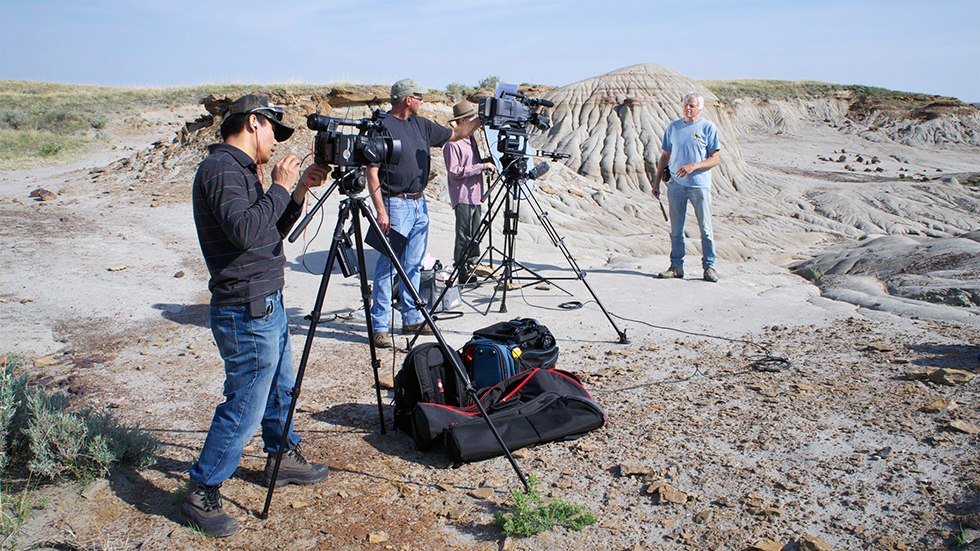Dino 101 Online Course: Register Now
Course Preview
See first-hand some of the cool interactive learning pieces in the course, including:
- Navigate the Geologic Time Scale
- Put Together a Tyrannosaurus Skeleton
- Label a Phylogenic Tree
Take the Course
Here's how:
1. Sign up with Coursera.2. Register for the Dino 101 Course.
3. Start the course beginning Sept. 3
Connection with Udacity
While Dino101 is on the Coursera platform, we also want to thank Udacity, with whom we have a research MOU, as they have been heavily involved in the pedagogical setup of Dino 101 and we are happy to have their ongoing support.
About the Course
Dino 101: Dinosaur Paleobiology is a 12-lesson course teaching a comprehensive overview of non-avian dinosaurs. Topics covered: anatomy, eating, locomotion, growth, environmental and behavioral adaptations, origins and extinction. Lessons are delivered from museums, fossil-preparation labs and dig sites.
Estimated workload: 3-5 hrs/wk for non-credit; 7-10 hrs/wk for credit.
Workload: 3-10 hours/week
More Course Information
Week 1: "Appearances and Anatomy" covers the diversity in dinosaur appearances, and will be able to identify major features of the major groups of dinosaurs.
Week 2: "Death and Fossilization" describes how fossils form, how we interpret the taphonomy of skeletons and bonebeds, and looks at the possible biases taphonomic events may create in the fossil record.
Week 3: "Eating" looks at the variety of food types, feeding habits, and feeding adaptations amongst the major groups of dinosaurs.
Week 4: "Moving Around" helps students understand the general modes and styles of locomotion in the major dinosaur groups. The lesson also describes general methods of evaluating hypotheses on locomotion.
Week 5: "Birth, Growth, Reproduction" provides a generalized life history of a dinosaur, from birth through adulthood, including reproduction. The student will be able to describe major techniques of evaluating growth stages and rates in dinosaurs.
Week 6: "Attack and Defence" examines the behaviours and structures that may have served for attack or defence through the lifetime of a dinosaur.
Week 7: "What is a Species" will teach the different ways of defining what a species is. Students will be able to compare the strengths and weaknesses of different species concepts for different situations.
Week 8: "Evolution" will describe the basic theories of speciation, and discusses how how these different methods of speciation may have occurred, including both hypothetical and empirical examples.
Week 9: "Stratigraphy and Geologic Time" provides basic stratigraphic concepts and the scale of earth history. Students will understand the evolution of dinosaurs through time, including which groups evolved when and where.
Week 10: "Palaeogeography and Plate Tectonics" presents the basic concepts in plate tectonics and the evolution of the earth's surface.
Week 11: "Dinosaur Origins" will look at the evolution of dinosaurs from non-dinosaurian archosaurs.
Week 12: "Dinosaur Extinction" will examine the end-Cretaceous extinction event, and provide examples of vertebrate groups that both persisted and died out during the event.
Recommended Background
No background is required; all are welcome!
Suggested Readings
Although the lectures are designed to be self-contained, there are many good books available on dinosaurs. Recent books we can recommend for the interested students include:
- The Complete Dinosaur, 2nd edition, (edited by Brett-Surman, Holtz and Farlow), Indiana University Press.
- Dinosaur Paleobiology (by S. Brusatte), Wiley Blackwell.
Course Format
The class will consist of lecture videos, which are 1-2 minutes in length, interposed with integrated quiz questions in addition to a unit test after each of the 12 lessons. Students taking the course for credit at the University of Alberta will be required to take a midterm and final exam as well.
What resources will I need for this class?
An internet connection and a sense of adventure.
What is the coolest thing I'll learn if I take this class?
In addition to learning about dinosaurs, you will learn about how they lived, what they ate, how they fought, about their origins and extinction.
Dinosaur Research
Behind the Scenes
The Crew
Digital Learning at U of A
UAlberta's first MOOCs, Dino 101 and Understanding Video Games, are a couple of the digital learning initiatives that are part of our larger digital learning strategy reflecting our long history of innovation in research of teaching and learning technologies.
